小学常见英语近义词辨析
- 格式:docx
- 大小:2.11 MB
- 文档页数:4
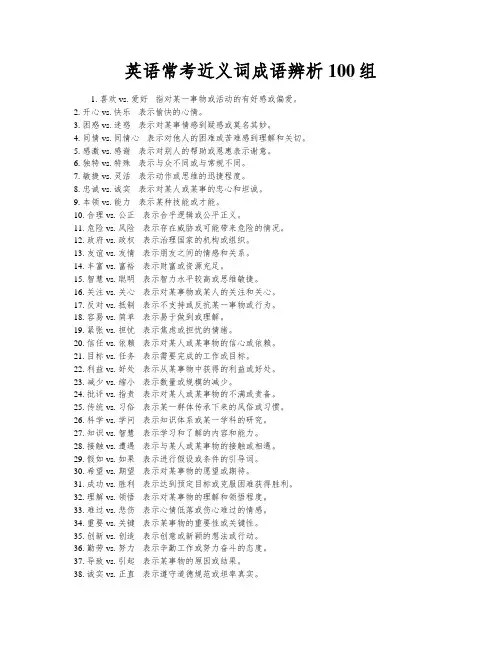
英语常考近义词成语辨析100组1. 喜欢 vs. 爱好 - 指对某一事物或活动的有好感或偏爱。
2. 开心 vs. 快乐 - 表示愉快的心情。
3. 困惑 vs. 迷惑 - 表示对某事情感到疑惑或莫名其妙。
4. 同情 vs. 同情心 - 表示对他人的困难或苦难感到理解和关切。
5. 感激 vs. 感谢 - 表示对别人的帮助或恩惠表示谢意。
6. 独特 vs. 特殊 - 表示与众不同或与常规不同。
7. 敏捷 vs. 灵活 - 表示动作或思维的迅捷程度。
8. 忠诚 vs. 诚实 - 表示对某人或某事的忠心和坦诚。
9. 本领 vs. 能力 - 表示某种技能或才能。
10. 合理 vs. 公正 - 表示合乎逻辑或公平正义。
11. 危险 vs. 风险 - 表示存在威胁或可能带来危险的情况。
12. 政府 vs. 政权 - 表示治理国家的机构或组织。
13. 友谊 vs. 友情 - 表示朋友之间的情感和关系。
14. 丰富 vs. 富裕 - 表示财富或资源充足。
15. 智慧 vs. 聪明 - 表示智力水平较高或思维敏捷。
16. 关注 vs. 关心 - 表示对某事物或某人的关注和关心。
17. 反对 vs. 抵制 - 表示不支持或反抗某一事物或行为。
18. 容易 vs. 简单 - 表示易于做到或理解。
19. 紧张 vs. 担忧 - 表示焦虑或担忧的情绪。
20. 信任 vs. 依赖 - 表示对某人或某事物的信心或依赖。
21. 目标 vs. 任务 - 表示需要完成的工作或目标。
22. 利益 vs. 好处 - 表示从某事物中获得的利益或好处。
23. 减少 vs. 缩小 - 表示数量或规模的减少。
24. 批评 vs. 指责 - 表示对某人或某事物的不满或责备。
25. 传统 vs. 习俗 - 表示某一群体传承下来的风俗或习惯。
26. 科学 vs. 学问 - 表示知识体系或某一学科的研究。
27. 知识 vs. 智慧 - 表示学习和了解的内容和能力。
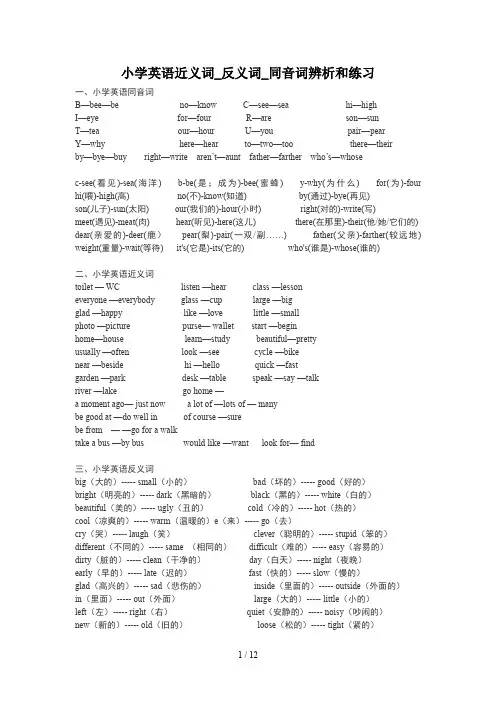
小学英语近义词_反义词_同音词辨析和练习一、小学英语同音词B—bee—be no—know C—see—sea hi—highI—eye for—four R—are son—sunT—tea our—hour U—you pair—pear Y—why here—hear to—two—too there—their by—bye—buy right—write aren’t—aunt father—farther who’s—whosec-see(看见)-sea(海洋) b-be(是;成为)-bee(蜜蜂) y-why(为什么) for(为)-four hi(喂)-high(高) no(不)-know(知道) by(通过)-bye(再见)son(儿子)-sun(太阳) our(我们的)-hour(小时) right(对的)-write(写)meet(遇见)-meat(肉) hear(听见)-here(这儿) there(在那里)-their(他/她/它们的) dear(亲爱的)-deer(鹿)pear(梨)-pair(一双/副……) father(父亲)-farther(较远地) weight(重量)-wait(等待) it's(它是)-its(它的) who's(谁是)-whose(谁的)二、小学英语近义词toilet — WC listen —hear class —lessoneveryone —everybody glass —cup large —bigglad —happy like —love little —smallphoto —picture purse— wallet start —beginhome—house learn—study beautiful—prettyusually —often look —see cycle —bikenear —beside hi —hello quick —fastgarden —park desk —table speak —say —talkriver —lake go home —a moment ago— just now a lot of —lots of — manybe good at —do well in of course —surebe from ——go for a walktake a bus —by bus would like —want look for— find三、小学英语反义词big(大的)----- small(小的)bad(坏的)----- good(好的)bright(明亮的)----- dark(黑暗的)black(黑的)----- white(白的)beautiful(美的)----- ugly(丑的)cold(冷的)----- hot(热的)cool(凉爽的)----- warm(温暖的)e(来)----- go(去)cry(哭)----- laugh(笑)clever(聪明的)----- stupid(笨的)different(不同的)----- same (相同的)difficult(难的)----- easy(容易的)dirty(脏的)----- clean(干净的)day(白天)----- night(夜晚)early(早的)----- late(迟的)fast(快的)----- slow(慢的)glad(高兴的)----- sad(悲伤的)inside(里面的)----- outside(外面的)in(里面)----- out(外面)large(大的)----- little(小的)left(左)----- right(右)quiet(安静的)----- noisy(吵闹的)new(新的)----- old(旧的)loose(松的)----- tight(紧的)like(喜欢)----- hate(厌恶)open(开)----- close(关)quick(快的)----- slow(慢的)stand(站)----- sit(坐)short(矮的)----- tall(高的)short(短的)----- long(长的)thick(厚的)----- thin(薄的)thin(瘦的)----- fat(肥的)up(向上)------ down(向下)wrong(错的)----- right(对的)weak(弱的)----- strong(强壮的)young(年轻的)----- old(年老的练习:一、找出划线部分读音不同的单词( ) 1. A. clock B. box C. go D. doctor( ) 3. A. Tuesday B. Saturday C. today D. Thursday( ) 4. A. this B. they C. Maths D. there( ) 5. A. Friday B. like C. Science D. trick( ) 6. A. have B. about C. Maths D. Saturday三、按要求写单词1.have(现在分词)2.one(序数词)3.new(反义词)4.this(复数)5.this(反义词)6.have(第三人称单数)7.interest(形容词) 8.many(比较级) 9.we(宾格) (所有格)10.I(宾格) (所有格) 11.you(宾格) (所有格)12.they(宾格) (所有格) 13.she(宾格) (所有格)14.he(宾格) (所有格) 15.boy(复数) 16.family(复数)17.do(第三人称单数) 18.study(的三人称单数) 19.two(序数词) 20.three(序数词) 21.hot(反义词) 22.minus(反义词)23.I(同音词) 24.you(同音字母) 25.They’re(完全形式)四、根据要求写句子1. It’s Sunday.(对画线部分提问)2. I like English.(对画线部分提问)3. We have eight subjects this term.(对画线部分提问)4. We have Chinese, English, Maths and Science every morning.(对画线部分提问)5. the, lesson, it, on, first, is, Monday . (连词成句)6. Miss Li and her students are having a lesson.(改为一般疑问句,做肯定、否定回答)7. do, and, like, my, not, I, PE, brother.(连词成句)8. we, a, lessons, in, we, more, Maths, hope, have, week.(连词成句)9. He often reads English in the morning.(改为否定句)一、找出画线部分读音不同的一个单词A B C D( ) 1. over some mother puzzle( ) 2. after class start Saturday( ) 3. photo of note telephone( ) 4. orange clock today model( ) 5. wrong Wednesday week with( ) 6. family why happy sorry( ) 7. hear near heart earache( ) 8. tea great speak see三、按要求写单词1.stay(现在分词)2.wrong(反义词)3.bad(反义词)4.good(比较级)5.got(原形)6.I’m(完全形式)7.I’ve(完全形式) 8.hear(同音词) 9.class(复数)10.take(现在分词) 11.open(反义词) 12.fine(反义词)13.fat(反义词) 14.monkey(复数) 15.let’s(完全形式) 16.brother(对应词) 17.mother(对应词)四、根据要求写句子1. This is Helen speaking?(对画线部分提问) ,2. I can get some fruit for you?(改为一般疑问句,作肯定回答)3. I play football after school.(分为两句话来表达)4. I feel ill.(对画线部分提问)5. I hope you get better soon.(改为否定句)6. I’ve got a headache and a bad cough.(对划线部分提问)7. dog, wrong, your, with, is, what(?)(连词成句)8. get, sister, hope, better, your, soon, mother, I, your, and(.)(连词成句)9. Chinese, got, fever, our, a, teacher, high, has(.)(连词成句)四、辨别下列各组单词划线部分的发音,相同的打(√),不同的打(×)。
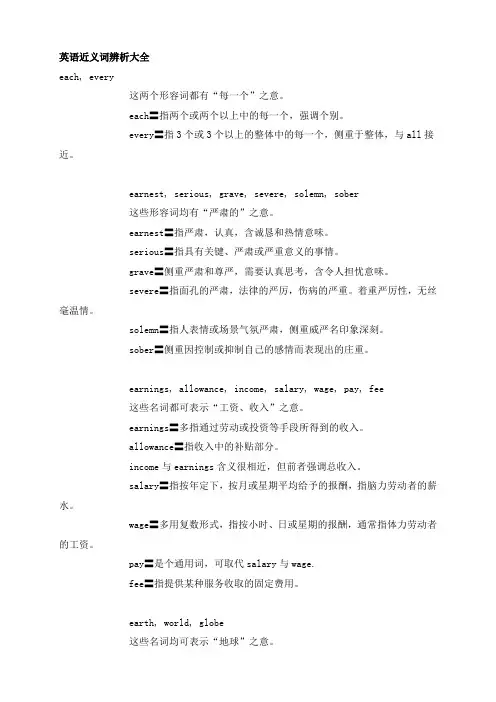
英语近义词辨析大全each, every这两个形容词都有“每一个”之意。
each〓指两个或两个以上中的每一个,强调个别。
every〓指3个或3个以上的整体中的每一个,侧重于整体,与all接近。
earnest, serious, grave, severe, solemn, sober这些形容词均有“严肃的”之意。
earnest〓指严肃,认真,含诚恳和热情意味。
serious〓指具有关键、严肃或严重意义的事情。
grave〓侧重严肃和尊严,需要认真思考,含令人担忧意味。
severe〓指面孔的严肃,法律的严厉,伤病的严重。
着重严厉性,无丝毫温情。
solemn〓指人表情或场景气氛严肃,侧重威严名印象深刻。
sober〓侧重因控制或抑制自己的感情而表现出的庄重。
earnings, allowance, income, salary, wage, pay, fee这些名词都可表示“工资、收入”之意。
earnings〓多指通过劳动或投资等手段所得到的收入。
allowance〓指收入中的补贴部分。
income与earnings含义很相近,但前者强调总收入。
salary〓指按年定下,按月或星期平均给予的报酬,指脑力劳动者的薪水。
wage〓多用复数形式,指按小时、日或星期的报酬,通常指体力劳动者的工资。
pay〓是个通用词,可取代salary与wage.fee〓指提供某种服务收取的固定费用。
earth, world, globe这些名词均可表示“地球”之意。
earth〓指表面有陆地和水,人类所居住行星的名字。
有时与“天”相对,泛指“地”。
world〓通常相当于earth与globe,现多用指地球,地球上的世界,社会和人。
globe〓指我们生活的地球,但强调其实体和圆形。
earth, clay, dirt, land, dust, soil, mud, ground这些名词都有“土地,土,泥”之意。
earth〓多指地表带有水分的泥土,较具体。
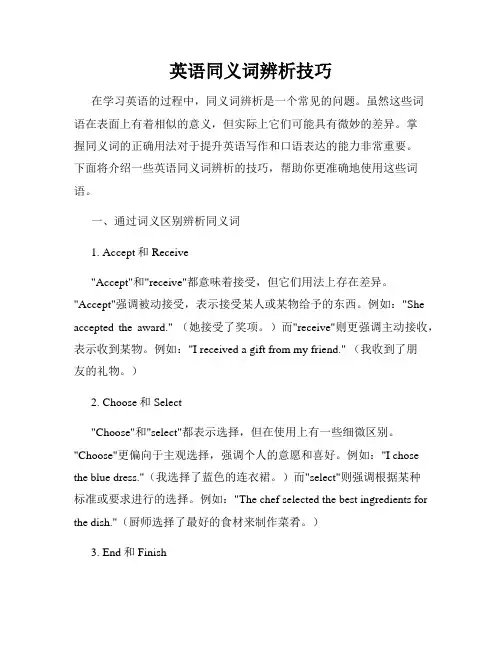
英语同义词辨析技巧在学习英语的过程中,同义词辨析是一个常见的问题。
虽然这些词语在表面上有着相似的意义,但实际上它们可能具有微妙的差异。
掌握同义词的正确用法对于提升英语写作和口语表达的能力非常重要。
下面将介绍一些英语同义词辨析的技巧,帮助你更准确地使用这些词语。
一、通过词义区别辨析同义词1. Accept和Receive"Accept"和"receive"都意味着接受,但它们用法上存在差异。
"Accept"强调被动接受,表示接受某人或某物给予的东西。
例如:"She accepted the award." (她接受了奖项。
)而"receive"则更强调主动接收,表示收到某物。
例如:"I received a gift from my friend." (我收到了朋友的礼物。
)2. Choose和Select"Choose"和"select"都表示选择,但在使用上有一些细微区别。
"Choose"更偏向于主观选择,强调个人的意愿和喜好。
例如:"I chose the blue dress."(我选择了蓝色的连衣裙。
)而"select"则强调根据某种标准或要求进行的选择。
例如:"The chef selected the best ingredients for the dish."(厨师选择了最好的食材来制作菜肴。
)3. End和Finish"End"和"finish"都表示结束,但用法不同。
"End"可以强调一个过程或状态的结束,强调结束的时间点。
例如:"The meeting ended at 5 PM."(会议在下午5点结束。
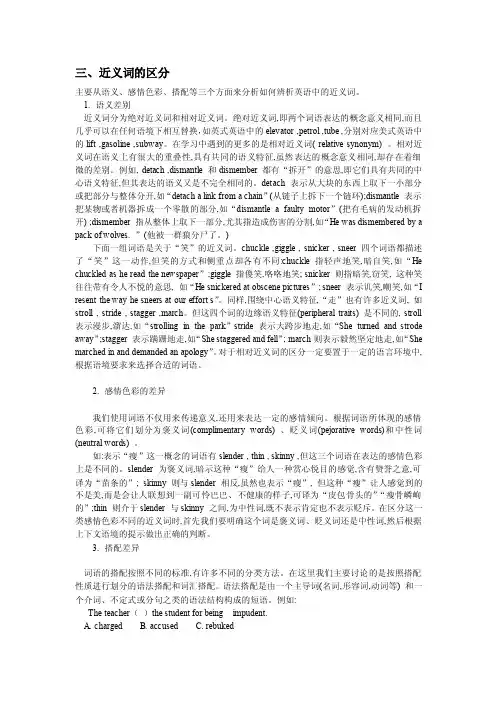
三、近义词的区分主要从语义、感情色彩、搭配等三个方面来分析如何辨析英语中的近义词。
1. 语义差别近义词分为绝对近义词和相对近义词。
绝对近义词,即两个词语表达的概念意义相同,而且几乎可以在任何语境下相互替换,如英式英语中的elevator ,petrol ,tube ,分别对应美式英语中的lift ,gasoline ,subway。
在学习中遇到的更多的是相对近义词( relative synonym) 。
相对近义词在语义上有很大的重叠性,具有共同的语义特征,虽然表达的概念意义相同,却存在着细微的差别。
例如, detach ,dismantle 和dismember 都有“拆开”的意思,即它们具有共同的中心语义特征,但其表达的语义又是不完全相同的。
detach 表示从大块的东西上取下一小部分或把部分与整体分开,如“detach a link from a chain”(从链子上拆下一个链环);dismantle 表示把某物或者机器拆成一个零散的部分,如“dismantle a faulty motor”(把有毛病的发动机拆开) ;dismember 指从整体上取下一部分,尤其指造成伤害的分割,如“He was dismembered by a pack of wolves. ”(他被一群狼分尸了。
)下面一组词语是关于“笑”的近义词。
chuckle ,giggle , snicker , sneer 四个词语都描述了“笑”这一动作,但笑的方式和侧重点却各有不同:chuckle 指轻声地笑,暗自笑,如“He chuckled as he read the newspaper”;giggle 指傻笑,咯咯地笑; snicker 则指暗笑,窃笑, 这种笑往往带有令人不悦的意思, 如“He snickered at obscene pictures”; sneer 表示讥笑,嘲笑,如“I resent the way he sneers at our effort s”。
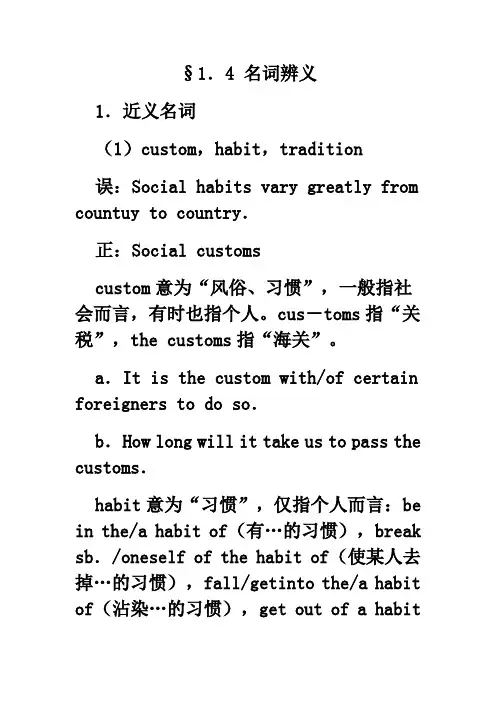
§1.4 名词辨义1.近义名词(1)custom,habit,tradition误:Social habits vary greatly from countuy to country.正:Social customscustom意为“风俗、习惯”,一般指社会而言,有时也指个人。
cus-toms指“关税”,the customs指“海关”。
a.It is the custom with/of certain foreigners to do so.b.How long will it take us to pass the customs.habit意为“习惯”,仅指个人而言:be in the/a habit of(有…的习惯),break sb./oneself of the habit of(使某人去掉…的习惯),fall/getinto the/a habit of(沾染…的习惯),get out of a habit(戒除某种习惯),out of habit(出于习惯);tradition指“传统”,多年以来形成的习俗:bytradition(根据传统或口传)。
c.You'll not be afraid of snakes if you understand their habits.d.We must keep up the fine tradition of plain living and hardwork.(2)dress,suit,costume,clothing,clothes,cloth误:My brotner never wears ready-made dresses.正:suits/clothesdress指“女装”,不过dress表示“a style or choice of clothing”(服装的型式或选择)时,也可用以指男性的服装;suit指“男装”,尤指“成套的衣服(如制服)”。
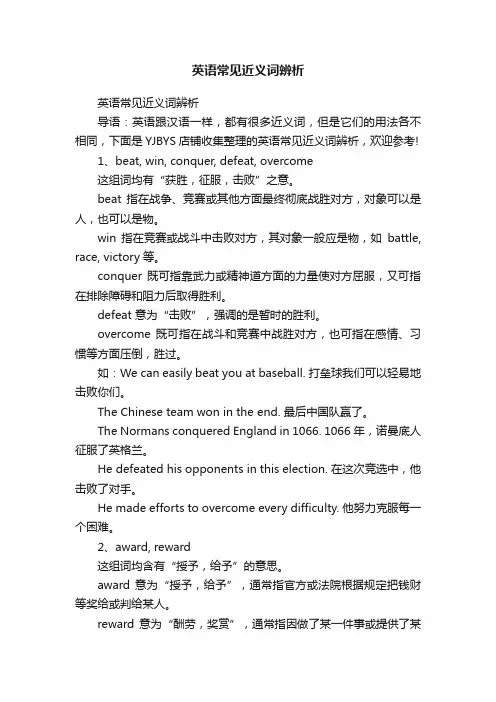
英语常见近义词辨析英语常见近义词辨析导语:英语跟汉语一样,都有很多近义词,但是它们的用法各不相同,下面是YJBYS店铺收集整理的英语常见近义词辨析,欢迎参考!1、beat, win, conquer, defeat, overcome这组词均有“获胜,征服,击败”之意。
beat 指在战争、竞赛或其他方面最终彻底战胜对方,对象可以是人,也可以是物。
win 指在竞赛或战斗中击败对方,其对象一般应是物,如battle, race, victory等。
conquer 既可指靠武力或精神道方面的力量使对方屈服,又可指在排除障碍和阻力后取得胜利。
defeat 意为“击败”,强调的是暂时的胜利。
overcome 既可指在战斗和竞赛中战胜对方,也可指在感情、习惯等方面压倒,胜过。
如:We can easily beat you at baseball. 打垒球我们可以轻易地击败你们。
The Chinese team won in the end. 最后中国队赢了。
The Normans conquered England in 1066. 1066年,诺曼底人征服了英格兰。
He defeated his opponents in this election. 在这次竞选中,他击败了对手。
He made efforts to overcome every difficulty. 他努力克服每一个困难。
2、award, reward这组词均含有“授予,给予”的意思。
award 意为“授予,给予”,通常指官方或法院根据规定把钱财等奖给或判给某人。
reward 意为“酬劳,奖赏”,通常指因做了某一件事或提供了某种服务而应得到的报答或酬谢。
如:He was awarded a medal for his outstanding contribution to science. 由于对科学作出了杰出贡献,他被授予一枚奖章。
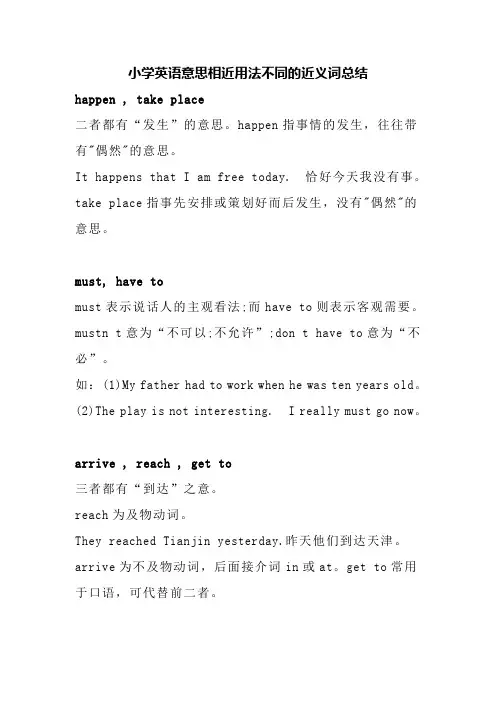
小学英语意思相近用法不同的近义词总结happen , take place二者都有“发生”的意思。
happen指事情的发生,往往带有"偶然"的意思。
It happens that I am free today. 恰好今天我没有事。
take place指事先安排或策划好而后发生,没有"偶然"的意思。
must, have tomust表示说话人的主观看法;而have to则表示客观需要。
mustn t意为“不可以;不允许”;don t have to意为“不必”。
如:(1)My father had to work when he was ten years old。
(2)The play is not interesting. I really must go now。
arrive , reach , get to三者都有“到达”之意。
reach为及物动词。
They reached Tianjin yesterday.昨天他们到达天津。
arrive为不及物动词,后面接介词in或at。
get to常用于口语,可代替前二者。
because , because of二者均表示“因为”because是连词,引导状语从句。
We stayed at home because it rained. 因为下雨,我们呆在家。
because of是短语介词,后面接名词性词语。
We stayed at home because of the rain . 因为下雨,我们呆在家。
in front of, in the front ofin front of…意思是"在……前面",指甲物在乙物之前,两者互不包括;其反义词是behind(在……的后面)。
如:He walked in fount of me。
他走在我的前面。
There are some flowers in fount of the house。
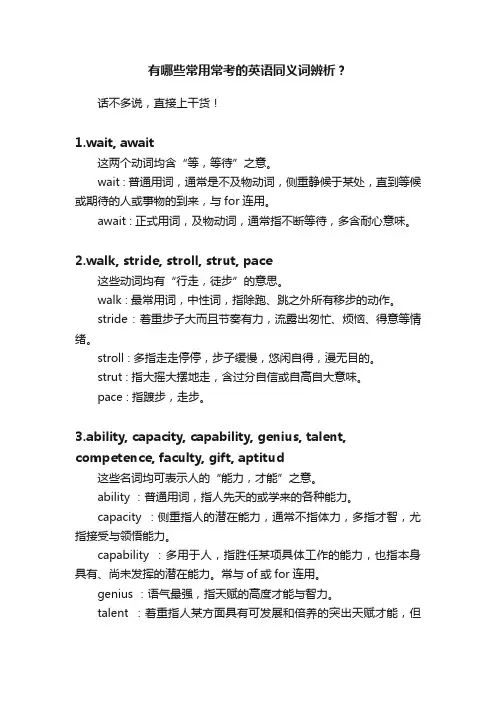
有哪些常用常考的英语同义词辨析?话不多说,直接上干货!1.wait, await这两个动词均含“等,等待”之意。
wait : 普通用词,通常是不及物动词,侧重静候于某处,直到等候或期待的人或事物的到来,与for连用。
await : 正式用词,及物动词,通常指不断等待,多含耐心意味。
2.walk, stride, stroll, strut, pace这些动词均有“行走,徒步”的意思。
walk : 最常用词,中性词,指除跑、跳之外所有移步的动作。
stride : 着重步子大而且节奏有力,流露出匆忙、烦恼、得意等情绪。
stroll : 多指走走停停,步子缓慢,悠闲自得,漫无目的。
strut : 指大摇大摆地走,含过分自信或自高自大意味。
pace : 指踱步,走步。
3.ability, capacity, capability, genius, talent, competence, faculty, gift, aptitud这些名词均可表示人的“能力,才能”之意。
ability :普通用词,指人先天的或学来的各种能力。
capacity :侧重指人的潜在能力,通常不指体力,多指才智,尤指接受与领悟能力。
capability :多用于人,指胜任某项具体工作的能力,也指本身具有、尚未发挥的潜在能力。
常与of或for连用。
genius :语气最强,指天赋的高度才能与智力。
talent :着重指人某方面具有可发展和倍养的突出天赋才能,但语意比genius弱。
competence :正式用词,侧重指令人满意的业务能力与水平,达到胜任某项工作等的要求faculty :指特殊的才能或智力。
gift :着重个人的天赋的才能或在某方面的显著本领,常暗含不能用一般规律作解释的意味aptitude :多指先天或后天习得的运用自如的能力,常暗示接受能力强,能迅速掌握一种学术训练或艺术技巧。
4.able, capable, competent这些形容词均含有“有能力的,能干的”之意able :最常用词,多用于褒义,着重指多方面的,经常性的,或潜在性的能力。
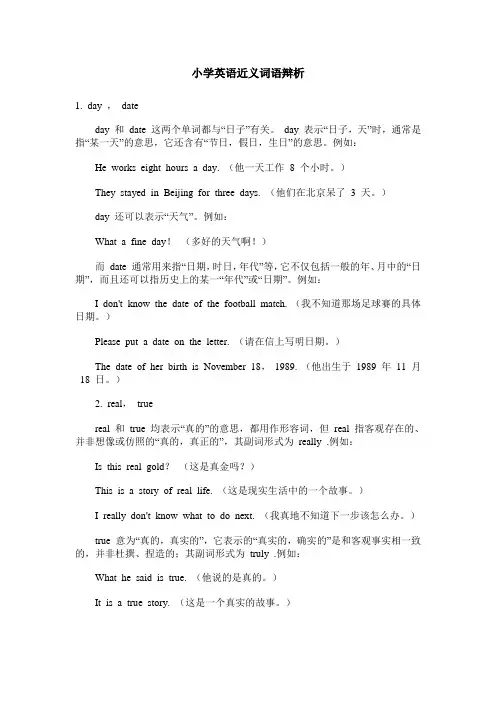
小学英语近义词语辩析1. day ,dateday 和date 这两个单词都与“日子”有关。
day 表示“日子,天”时,通常是指“某一天”的意思,它还含有“节日,假日,生日”的意思。
例如:He works eight hours a day. (他一天工作8 个小时。
)They stayed in Beijing for three days. (他们在北京呆了 3 天。
)day 还可以表示“天气”。
例如:What a fine day!(多好的天气啊!)而date 通常用来指“日期,时日,年代”等,它不仅包括一般的年、月中的“日期”,而且还可以指历史上的某一“年代”或“日期”。
例如:I don't know the date of the football match. (我不知道那场足球赛的具体日期。
)Please put a date on the letter. (请在信上写明日期。
)The date of her birth is November 18,1989. (他出生于1989 年11 月18 日。
)2. real,truereal 和true 均表示“真的”的意思,都用作形容词,但real 指客观存在的、并非想像或仿照的“真的,真正的”,其副词形式为really .例如:Is this real gold?(这是真金吗?)This is a story of real life. (这是现实生活中的一个故事。
)I really don't know what to do next. (我真地不知道下一步该怎么办。
)true 意为“真的,真实的”,它表示的“真实的,确实的”是和客观事实相一致的,并非杜撰、捏造的;其副词形式为truly .例如:What he said is true. (他说的是真的。
)It is a true story. (这是一个真实的故事。

小学英语中常见的同义词、近义词本文档以小学英语中常见的同义词、近义词为主,同时每组近义词都有基本的辨析。
a与an:都是不定冠词,a用在以辅音音素开头的单词前,表示“一个”;an用在以元音因素开头的单词前。
a few与a little:都表示“少许,一点”的意思。
a few修饰可数名词,a little修饰不可数名词。
almost与nearly:都可表示“几乎”,但要表示“接近”或“就要到了”时,最好用nearly;想表示“不足”或“尚差一点儿”时,最好用almost。
另外,句中有no,none,nothing,never等词时,不可以用nearly,却可以用almost。
a lot of、many与much:都可表示“许多”。
只是many修饰可数名词,much修饰不可数名词;a lot of也表示“许多”、“大量”,但比较口语化,其后可接可数名词,也可接不可数名词。
a moment ago与just now:都可表示“刚才”。
但just now还可表示“目前、现在”,just是加强语气的用法。
a moment ago常用在一般过去式中;just now常用在现在完成时中。
any与some:都可表示“一些”,二者既可以修饰可数名词又可以修饰不可数名词。
一般情况下,some常用在肯定句中,而any则常用在否定和疑问句中。
但是,在表示建议、反问、请求的疑问句中,多用some而不用any。
在介词without的否定句中常用some。
当any表示“任何,无论谁”的意思,起强调作用时,可以用在肯定句中。
beautiful、handsome与pretty:beautiful是“漂亮”的意思,多用于女性;handsome 是“英俊”的意思,主要是指男性;pretty是“讨人喜欢”的意思,但外表不一定漂亮,多指女孩、孩子。
be from与come from:都可表示“来自哪里”,指明说话者的家乡。
不过,come from 属于短暂动词,不和延续时间连用,而be from则可以;come from还可表示从某个地方来,而be from则不行。
小学英语常见近义词辨析1. above,on,over(在……上)above一般指位置高于某物,但不一定在正上方,也不接触另一物,其反义词是below。
如:The sun has risen above the horizon. 太阳已从地平线升起。
on指与另一物表面接触。
如:The book is on the desk. 书在桌子上。
over指一物在另一物的垂直上方,多暗示悬空,但也含“覆盖与……之上”之意思。
其反义词是under。
如:A plane flew over the Pacific Ocean. 一架飞机飞过太平洋。
2. big,large,great(大的)big“大的,巨大的”,常指程度、范围、规模、容积、重量、数量等(还可表示“伟大,重要”之意),常可与large互换,多用于具体的、有形的人或物,其反义词多为little/small。
如:Jam’s cake is the biggest of all. 吉姆的蛋糕是所有蛋糕中最大的。
There is a big tree beside the house. 房子旁边有一颗大树。
large“大的,巨大的”,常指面积、范围,可表示数和量(当它直接用于人时,可表示身体的大),其反义词为small。
如:They say China is a large and beautiful country. 他们说中国是一个面积大而美丽的国家。
We have a large farm. 我们有一个大农场。
great“大的,极大的,伟大的,重要的,超乎寻常的”,常指面积、数量、程度(或指抽象的东西,如知识、能力、人格等),用来指人时,表示“伟大的,杰出的”,其反义词为little/small。
如:We heard a great noise. 我们听到一个很大的响声。
Mao Zedong is a great leader of China. 毛泽东是中国的伟大领袖。
英语的近义词及其辨析英语是作为全球通用语言之一,对于学习者而言,熟练掌握英语的近义词及其辨析是非常重要的。
接下来我们来学习一些常用英语近义词及其辨析。
1. Accept & Receive这两个词的中文都是“接受”,但是在英语中有很大的区别。
Accept通常用于主动接受,代表着一个行动的意图,而Receive则是被动接受,比如我们会说“I received a letter this morning”,表示收到了一封信。
2. Admit & Acknowledge这两个词意思都是“承认”,但是使用环境和语气却不一样。
Admit常用于承认错误或过错,有时候还含有一定的负面意义,而Acknowledge则是更加委婉的承认,常用于表达感激或认同。
3. Advice & Advise这两个词看上去非常相似,但是意思却截然不同。
Advice是名词,表示建议或忠告,而Advise则是动词,表示给予建议、指导或忠告。
4. Allude & Refer这两个词都有“指”、“提及”的意思,但是使用环境不同。
Allude通常用于暗示或影射,而Refer则是更加直接的指向。
5. Assist & Help这两个词意思十分接近,但是用法上还是有区别的。
Assist更倾向于以积极的方式帮助,比如我们会说一位志愿者帮助他人,并且通常有一定的力量或技能支持。
而Help则是可以包括任何形式的帮助,不一定是积极的方式。
6. Appraise & Evaluate这两个词意思都是“评估”或“评价”,但是使用场合不同。
Appraise通常用于物品的估价或评估,而Evaluate更倾向于评价一个事件或过程。
比如,我们可以说:“The teacher appraised the book”,表示老师对这本书估价;而如果用Evaluate的话,就会表示老师对整个过程有一个评价。
当然,以上只是英语近义词的冰山一角。
常见的英语近义词辨析对于学习英语的人来说,辨析近义词是一项很重要的技能。
许多英语单词看起来虽然非常相似,但其实有着微妙的区别。
在正确使用这些单词时,混淆它们可能会引起交流误解。
在这篇文章中,我们将讨论一些常见的英语近义词辨析。
1. Accept和Except:这两个词虽然只差一个字母,但是其意思却迥然不同。
Accept 表示接受某物或某事物是正确的,而Except则表示排除掉一些事物,或者表示除去某个范围的对象。
所以,当你在阅读文章时,一定要注意上下文中这两个词的用法。
2. Good和Well:这两个词也非常容易混淆。
Good是一个形容词,表示“好的”、“优秀的”,而Well则是一个副词,表示“好地”、“健康的”。
如:He is a good man.(他是个好人。
)与He speaks English well.(他英语讲得很好。
)3. Affect和Effect:这两个词同样的容易混淆,而且通常会在文章中出现。
Affect 是一个动词,表示“影响”,而Effect则是一个名词,表示“结果”。
如:The weather will affect our travel plans.(天气将影响我们的旅行计划。
)与The effect of pollution on our environment is terrible.(污染对环境的影响很糟糕。
)4. Far和Farther:Far表示“远的”,而Farther则表示“更远的”。
如:The mountains are far from here.(这里离山很远。
)与He wanted to go farther north.(他想往北走得更远。
)5. Few和Little:这两个词虽然都表示“少的”,但是它们的用法有所不同。
Few 是用来表示可数名词,而Little则表示不可数名词。
如:Few people were there.(那里没有多少人。
常见英文近义词辨析100组1. accept vs. receiveAccept 暗示自愿接受,通常涉及主动选择。
Receive 则表示被动接受,无需选择或同意。
2. accessible vs. approachableAccessible 指容易获得或接近。
Approachable 指容易相处或交谈。
3. accomplish vs. achieveAccomplish 强调完成特定的任务或目标。
Achieve 则更广泛,表示达到一个更重大的目标或状态。
4. accurate vs. preciseAccurate 指信息准确无误,与事实一致。
Precise 指信息非常详细、精确,没有模糊或不确定性。
5. activity vs. actionActivity 指一般性的、持续的行动。
Action 指具体的、一次性的行为。
6. advice vs. counselAdvice 指针对特定情况或问题的建议。
Counsel 通常指更全面、更深入的指导和建议。
7. affect vs. effectAffect 作为动词,表示影响或改变。
Effect 作为名词,表示结果或后果。
8. agree vs. concurAgree 指双方就某件事达成一致意见。
Concur 表示同意或支持他人的意见或决定。
9. almost vs. nearlyAlmost 表示非常接近,但没有完全达到。
Nearly 也表示非常接近,但通常比 almost 更明确。
10. amazing vs. astonishingAmazing 表示令人印象深刻或惊奇。
Astonishing 表示令人震惊或难以置信。
11. appear vs. seemAppear 指表面上或明显的样子。
Seem 指主观印象或感觉。
12. appreciate vs. admireAppreciate 指对某事或某人的价值或品质表示赞赏。
Admire 指对某事或某人持有高度的尊敬或钦佩。
1. abandon desert discard quitabandon: 放弃,丢弃,抛弃。
指因为外界的压力或影响完全放弃,因迫不得已而放弃,如: abandon obligation 放弃任务。
desert:抛弃,舍弃,指某人或某物在困境中“被抛弃”。
如: desert the baby after giving birth 生下婴儿后将其抛弃。
discard: 丢弃,抛弃(老朋友或旧物)。
如:discard one’s old friends 抛弃老朋友。
quit: 离开,退出,突然放弃。
指主动放弃或离开。
如: quit one’s job 辞职。
2. abolish cancel remove eliminateabolish:废除,强调对法律或旧习惯的废除。
如: abolish slavery 废除奴隶制。
cancel: 取消,强调对原定的会议、计划、安排等取消。
如: cancel the meeting 取消会议。
remove: 出去,撤去。
强调位置的移动或从远处消失。
如: remove the stain from clothes 清除衣服上的污渍。
eliminate: 除去,剔除,淘汰。
强调使彻底消失。
如: eliminate sb. From competition 把某人淘汰出局,eliminate poverty 消除贫困3. abuse curse condemn criticizeabuse:谩骂,辱骂;滥用,虐待。
指出口恶言骂人。
curse:诅咒,咒骂。
表示愤怒或嫉恨。
condemn: 谴责,强调由于不良行为或过失而受到强烈谴责。
用于正式、严肃的场合。
criticize: 批评某人,强调指出某人的错误或不足之处。
4. accelerate speed hasten quickenaccelerate: 加速,既可指使物体加快速度运动,也可指使事情进程加快。
如:accelerate the economic growth 加快经济增长的速度。
英语中的同义词和反义词辨析在学习英语的过程中,我们经常会遇到许多同义词和反义词。
虽然它们的意思可能相似或相反,但细微的差别却能影响语言表达的准确性和语义的丰富性。
因此,正确理解和运用这些同义词和反义词对于提高英语表达能力至关重要。
本文将从不同角度讨论几组常见的同义词和反义词,以帮助读者更好地掌握它们的用法。
一、大、小在英语中,我们经常会用到"big"和"small"这两个词来描述大小。
然而,它们的同义词和反义词却有很多。
例如,"large"和"tiny"都可以用来表示"big"和"small"的意思,但它们的语义略有不同。
"Large"更常用于形容物体或空间的尺寸较大,而"tiny"则更常用于形容非常小的物体。
此外,"big"还可以与"small"的反义词"small"相对应,而"large"则可以与"small"的反义词"big"相对应。
二、快、慢另一个常见的同义词和反义词组合是"fast"和"slow"。
这两个词都可以用来描述速度的快慢。
然而,它们的同义词和反义词也有一些不同之处。
例如,"quick"和"slow"都可以用来表示"fast"和"slow"的意思,但"quick"更强调速度的迅猛和敏捷,而"slow"则更强调速度的缓慢和耐心。
此外,"fast"还可以与"slow"的反义词"slow"相对应,而"quick"则可以与"slow"的反义词"fast"相对应。
小学常见英语近义词辨析1、 a , an 这是两个不定冠词。
A用于辅音因素开头的单词前,表示“一个”;an 用在以元音因素开头的单词前,表示“一个”。
Eg: Is this a pencil? 这是一支铅笔吗? There is an apple on the table. 桌子上有一个苹果。
a university 特殊2、day , date 这两个单词都与“日子”有关。
Day表示“日子,天”时,通常是指“某一天”的意思,它还含有“节日,假日,生日”的意思。
而date通常用来指“日期,时日,年代”等,它不仅包含一般的年、月中的“日期”,而且还可以指历史上的某一“年代”或“日期”。
Eg: He works eight hours a day. 他一天工作八个小时。
I don’t remember the date of the food. 我没有记住食物的具体日期。
3、clothes , cloth clothes统指各种衣服,谓语动词永远是复数;cloth指“布”,为不可数名词。
Eg: Welcome come to M&G Clothes Store! 欢迎来到M&G服装店! I want some colorful cloth. 我想要一些色彩鲜艳的布。
4.、home , house , family home指“家”包括住处和家人;house指“房子,住宅”;family 指“家庭,家庭成员”。
Eg: I have a big/happy family. This house is big and beautiful. I have to stay at home on Sunday.5、voice , noise voice指“人的嗓音”;noise 指“噪音”。
Eg: I hate the loud noise outside. 我讨厌外面的噪音。
I raise my voice. 我提高我的嗓音。
6、photo , picture photo 指用照相机拍摄的照片;picture可指相片,图片或电影片。
Eg: This is a photo of my family. 这是我的全家福。
I draw a picture for my English teacher. 我为我的英语老师画了一幅画。
7、work , job 二者均指“工作”。
Work 不可数,job可数。
Eg: My work is interesting. 我的工作很有趣。
Policeman is a good job. 警察是个好工作。
8、chick , chicken 二者均指“小鸡”, chicken 还可指“鸡肉”。
Eg: The chicken is very delicious. There are four chicks in the yard.9、beautiful , handsome , pretty beautiful 是“漂亮”的意思,多用于女性;handsome是“英俊”的意思,主主要指男性; pretty 是“讨人喜欢”的意思,但外表不一定漂亮,多指女孩,孩子。
Eg: She is a beautiful nurse. My brother is tall and handsome. Lucy is a pretty girl.10、leave , forget 二者都有“忘掉”的意思。
有具体的地点应该用leave, 在没有具体的地点的情况下,要用forget\.Eg: Don’t forget to bring your dictionary. She leaves English book at home.11、other , another other是“其他的,另外的”的意思;another 是“另一个,又一个”的意思。
Other后接名词复数,another 后接名词单数。
Eg: What other animals do you like? This T-shirt is too large, please show me another.12、 many , much , a lot of many 和可数名词连用,much和不可数名词连用; alot of 既可以和可数名词连用又可以和不可数名词连用。
Eg: I have many story books. You eat too much this night.. There are a lot of apples on the table. There are a lot of water in the pool.13、 tall , high tall 指人或动物;high常指物体。
Eg: The building is very high. He is tall14、fast , quickly fast 侧重于指人或物体具有运动速度快的特点;quickly 侧重指某事完成或发生的快。
Eg: My P.E. teacher runs fast. Please remember the words quickly.15、good , well good是形容词;well是副词,但指身体状况好时是形容词。
两者都是“好”的意思。
Eg: No news is good news. 没消息就是好消息。
--How are you? --I’m well.16、 almost , nearly 两者均为“几乎,差不多”的意思,和否定词连用用almost.Eg: I almost don’t do anything. 我几乎什么也没做。
I nearly lost my school bag. 我差点丢了我的书包。
17、excited , exciting excited 意为“兴奋的“,一般指人; exciting 意为“令人兴奋的”,一般指物。
Eg: I’m excited. 我很兴奋。
The news is exciting. 这个消息令人兴奋。
18、a few , a little 两者都表示“少许,一点”的意思。
a few 修饰可数名词;a little修饰不可数名词。
Eg: There is a little coffee in the glass. 杯子里有点咖啡。
He has a few bananas. 他有几根香蕉。
19、turn on , open 两者都是“打开”的意思。
Turn on 指“打开电源、电源、水、气体等”,他的反义短语是turn off; open 则是指“打开门,窗或带盖得东西“,其反义词是close. Eg: The room is too dark. Turn on the lights please. 房间里太黑了,请打开灯。
It’s hot in the bedroom. Let’s open the window s. 卧室里很热,让我们打开窗子吧。
20、put on , wear 它们都是“穿“的意思。
Put on 强调穿的动作;wear 强调穿的状态。
Eg: It’s snowing outside. You should put on your coat. 外面下雪了,你最好穿上你的外套。
My father wears a yellow T-shirt today. 我爸爸穿了一件黄色的t血衫。
21. would like , wantwould like 和 want 都是“想要”的意思。
Would like 多用于口语,语气委婉;want 则用于书面语,比较正式。
Eg: Would you like some milk? 你想要一些牛奶吗? I want to be an actor? 我想成为一名演员。
22、too…to , enough too…to 表示“太……而不能”, too 和to 的中间用形容词或副词的原形; enough 要放在名词前,形容词或副词之后。
Eg :The child is too young to go to school. 这个孩子太小,还不能上学。
The child is not old enough to go to school. 这个小孩还没到上学的年纪。
23、hope , miss hope 表示“希望,盼望,期待”,后常常接不定式短语或that引导的从同;miss 表示“想念,惦念,错过”等含义。
Eg: I hope that you’ll have a lovely vacation. 我希望你能有一个快乐的假期。
His mother misses him very much. 他母亲很惦记他。
24、 must , need must 表示“必须,应该”,属于情态动词; need作为情态动词,则表示“需要,必须”,多用于疑问句和否定句。
Eg: I must go home now. 我现在得回家了。
Do you need some sugar? 你需要一些糖吗?25、how much , how many how much 和how many 都是“多少”的意思。
How much 用于修饰不可数名词,它还可以询问价格;how many 用于修饰可数名词。
Eg: How much is this pen? 这只钢笔多少前? How many students are there in your class? 你们班有多少个学生?26.、talk , speak talk 的意思是“谈话,交谈”,后面可以跟to, with, about 等介词;speak 的意思是“说,演讲”,如果是说某种语言,要用speak.Eg: I can speak English. 我会说英语。
He is talking with his father. 他正在和他的爸爸交谈。
27、some , any 两者都是“一些”的意思,都可以用来修饰可数名词的复数和不可数名词。
两者在用法上也有区别; some 用在可定句中,any一般用于疑问和否定句中。
Eg: He wants some water. 他想要一些水。
Are there any teachers in the office? 办公室里有老师在吗?28、cup , glass 两者都有“杯子”的意思。
Cup 一般指有把儿的陶瓷杯子,用来装茶、咖啡等;glass 是指用玻璃制成的杯子,用来装水、牛奶、果汁等。
Eg: Would you like a cup of tea? 你要来一杯茶吗? She give me a glass of water. 他给了我一杯水。